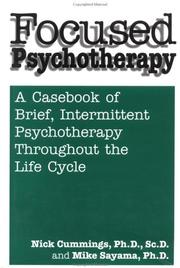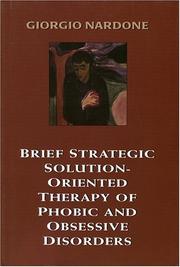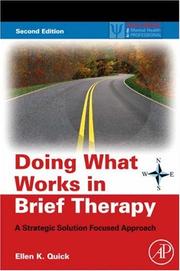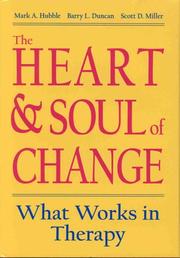| Listing 1 - 6 of 6 |
Sort by
|

ISBN: 0876307896 Year: 1995 Publisher: New York (N.Y.): Brunner and Mazel
Abstract | Keywords | Export | Availability | Bookmark
 Loading...
Loading...Choose an application
- Reference Manager
- EndNote
- RefWorks (Direct export to RefWorks)

ISBN: 9780125696609 0125696604 9780080530499 0080530494 1281033510 9786611033514 Year: 1996 Publisher: San Diego : Academic Press,
Abstract | Keywords | Export | Availability | Bookmark
 Loading...
Loading...Choose an application
- Reference Manager
- EndNote
- RefWorks (Direct export to RefWorks)
The first of its kind, Doing What Works in Brief Therapy is a guidebook to strategic solution focused therapy, a model which combines the principles and techniques of the Mental Research Institute's brief strategic therapy and the Brief Family Therapy Center's solution focused therapy. The book explains how the strategic emphasis on clarification of the problem and interruption of what does not work can complement and enhance the solution-focused emphasis on amplification of what does work. The text reviews the theory and presents specific treatment techniques. Case examples illustrate

ISBN: 1568218044 Year: 1996 Publisher: Northvale Aronson
Abstract | Keywords | Export | Availability | Bookmark
 Loading...
Loading...Choose an application
- Reference Manager
- EndNote
- RefWorks (Direct export to RefWorks)
Obsessive-compulsive disorder --- Phobias --- Solution-focused brief therapy --- Strategic therapy --- Treatment

ISBN: 9780125696609 0125696604 9780080530499 0080530494 9786611033514 1281033510 Year: 1996 Publisher: San Diego : Academic Press,
Abstract | Keywords | Export | Availability | Bookmark
 Loading...
Loading...Choose an application
- Reference Manager
- EndNote
- RefWorks (Direct export to RefWorks)
The first of its kind, Doing What Works in Brief Therapy is a guidebook to strategic solution focused therapy, a model which combines the principles and techniques of the Mental Research Institute's brief strategic therapy and the Brief Family Therapy Center's solution focused therapy. The book explains how the strategic emphasis on clarification of the problem and interruption of what does not work can complement and enhance the solution-focused emphasis on amplification of what does work. The text reviews the theory and presents specific treatment techniques. Case examples illustrate

ISBN: 1281144800 9786611144807 0080557325 0123741750 9780123741752 9780080557328 Year: 2008 Publisher: Boston ; Amsterdam : Academic Press,
Abstract | Keywords | Export | Availability | Bookmark
 Loading...
Loading...Choose an application
- Reference Manager
- EndNote
- RefWorks (Direct export to RefWorks)
This book is both a set of procedures for the therapist and a philosophy- one that is shared with clients and one that guides the work of the therapist. This 2nd edition continues its excellence in offering clinicians a guide to doing what works in brief therapy--for whom, and when and how to use it. Psychotherapy that follows these guidelines validates the client's most important concerns - and it often turns out to be surprisingly brief. Author Ellen Quick integrates strategic and solution focused therapy and includes guidelines for tailoring technique and interventions to client characteris
Solution-focused brief therapy. --- Strategic therapy. --- Psychotherapy --- Behavioral Disciplines and Activities --- Psychiatry and Psychology --- Psychotherapy, Brief --- Psychiatry --- Health & Biological Sciences --- SFBT (Solution-focused brief therapy) --- Brief psychotherapy --- Solution-focused therapy

ISBN: 155798557X 9781557985576 Year: 2006 Publisher: Washington, DC: American psychological association,
Abstract | Keywords | Export | Availability | Bookmark
 Loading...
Loading...Choose an application
- Reference Manager
- EndNote
- RefWorks (Direct export to RefWorks)
Therapy is a profession under assault. Perhaps more than any time before, payers, consumer groups and legislators are putting what therapists do under the closest of scrutiny. Within the field itself, and especially among different theoretical schools, quarrels and contentious claims continue unabated. Various factions cast their model and their techniques as superior to the rest. Joining manualized therapy and protocol-driven interventions, so-called experimentally established therapies represent the latest campaign for a "technically correct" standard of care. One former president of the American Psychological Association was right: Therapy is being industrialized, as are virtually all who practice it. At the root of many controversies currently surrounding therapy is the important question of what works. Is efficiency based on the singular curative powers of specialized techniques or do other variables account for patient change? This book proposes the answer, which is not to be found in different languages, theories or procedural differences. Instead, the answer lies in common factors - the ingredients of effective therapy shared by all orientations. More than 40 years of outcome research is pointing the way to what really matters in the therapist's day-to-day work. The editors have assembled some of the best researchers and practitioners in the field today. Through their efforts, findings from multiple perspectives - clinical, research, quantitative and qualitative evidence, individual and family therapy, medical and school psychology, and, finally, a broad range of theoretical orientations - are bridged. The result is a book that provocatively interprets the empirical foundation of how people change in a scholarly yet accessible manner. Clinicians will especially appreciate the wealth of practical suggestions for employing the common factors in their daily practice.
#PBIB:2000.2 --- #KVHB:Psychotherapie --- #KVHB:Psychiatrie --- Strategic therapy --- Differential therapeutics --- Mental Disorders --- Treatment Outcome --- Decision Making --- Psychiatry --- Psychotherapy --- therapy --- methods --- Psychagogy --- Therapy (Psychotherapy) --- Differential therapeutics in psychiatry --- Mental illness --- Clinical sociology --- Mental health counseling --- Treatment --- Methodology --- Outcome Assessment (Health Care) --- Thinking --- Prognosis --- Behavioral Disciplines and Activities --- Behavioral Sciences --- Psychiatry and Psychology --- Medicine --- Diagnosis --- Outcome and Process Assessment (Health Care) --- Mental Processes --- Health Occupations --- Quality of Health Care --- Disciplines and Occupations --- Analytical, Diagnostic and Therapeutic Techniques and Equipment --- Psychological Phenomena and Processes --- Health Care Evaluation Mechanisms --- Health Services Administration --- Health Care Quality, Access, and Evaluation --- Health Care --- Health & Biological Sciences --- Mental Disorders - therapy --- Psychiatry - methods --- Psychiatry - Differential therapeutics
| Listing 1 - 6 of 6 |
Sort by
|

 Search
Search Feedback
Feedback About UniCat
About UniCat  Help
Help News
News